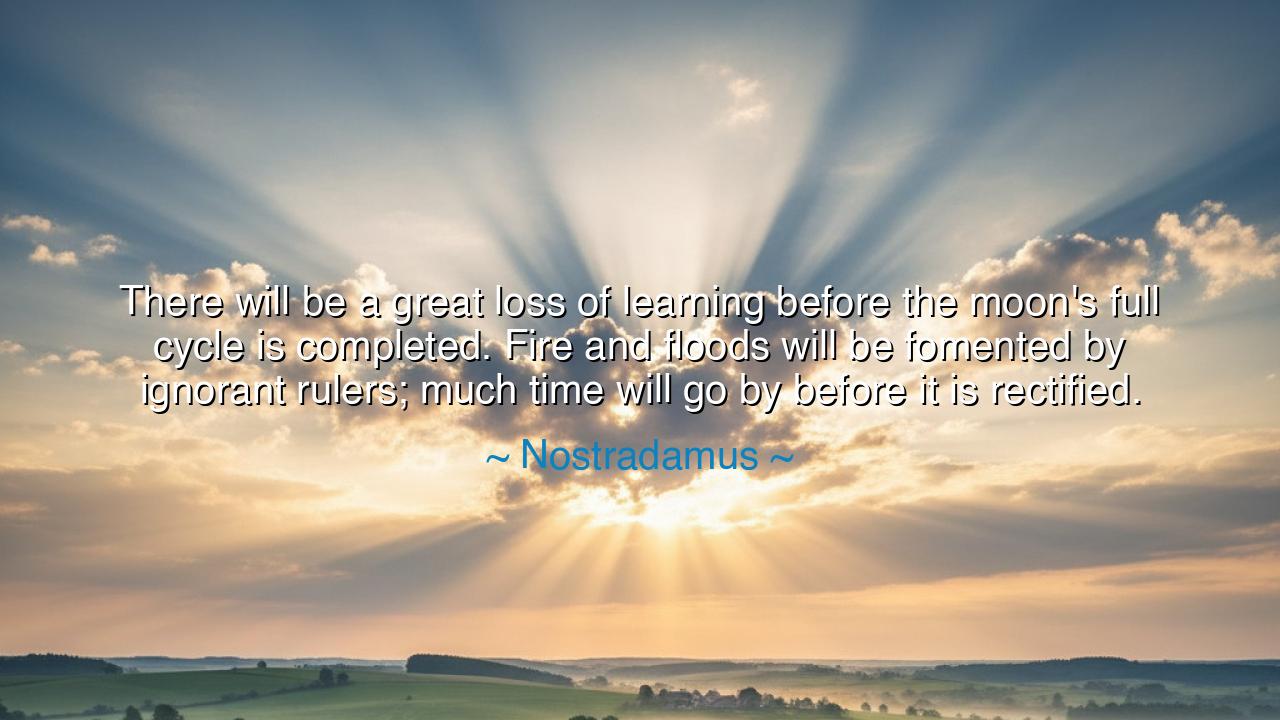
There will be a great loss of learning before the moon's full
There will be a great loss of learning before the moon's full cycle is completed. Fire and floods will be fomented by ignorant rulers; much time will go by before it is rectified.






“There will be a great loss of learning before the moon's full cycle is completed. Fire and floods will be fomented by ignorant rulers; much time will go by before it is rectified.” Thus spoke Nostradamus, the mysterious seer of the sixteenth century, whose visions, veiled in poetry and symbol, have haunted the imaginations of generations. In these words, he foresees a time of darkness — not merely of nature’s wrath, but of the mind’s decay. His warning is not only of fire and flood, but of a greater catastrophe: the loss of wisdom, the withering of understanding among men. For Nostradamus knew that the world’s greatest tragedies do not begin with nature’s fury, but with the blindness of those who lead and the forgetfulness of those who follow.
To the ancients, this prophecy would have sounded both familiar and sacred. Civilizations rise not only on strength of arms, but upon the pillars of knowledge and virtue. When these fall, even empires crumble into dust. Nostradamus speaks of the moon’s cycle — a symbol of time’s eternal rhythm, of waxing and waning, growth and decay. He suggests that learning, too, follows such a cycle. When wisdom is neglected, ignorance takes root; when truth is silenced, confusion reigns. His warning is thus timeless: that humanity must guard its learning as sacred fire, lest the world fall once again into a long and bitter night of unreason.
Indeed, history bears witness to his words. In the centuries before him, Europe had endured the Dark Ages, when knowledge flickered faintly in the monasteries while war, superstition, and tyranny swept across the land. The libraries of Alexandria had already burned; the sciences of Greece and the philosophies of the East were buried beneath the ashes of conquest. Later, in his own time, Nostradamus lived amid plague, war, and religious fanaticism — a world where truth itself was persecuted. He saw how ignorant rulers, driven by fear and ambition, could unleash devastation both physical and spiritual. He foresaw that such cycles would return — that humanity, if it forgot the lessons of the past, would again bring upon itself fire and flood.
One might look to later centuries and see his prophecy echoing still. The burning of books under totalitarian regimes, the suppression of free thought, the manipulation of truth — all are forms of the “great loss of learning” he foretold. When knowledge is twisted by power or drowned in apathy, civilization trembles. Consider the Cultural Revolution in China, when art, philosophy, and scholarship were cast aside in the name of ideology, and countless voices of wisdom were silenced. Or the World Wars, when nations led by ignorant pride brought upon the earth both fire and flood, and generations of learning were lost amid destruction. Nostradamus, though centuries distant, spoke of such things — not as fate, but as warning.
There is also a subtler meaning within his words — for “fire and flood” need not only be literal. The fire may be the fire of hatred, consuming the hearts of men; the flood, the flood of misinformation and folly that drowns reason. These are the disasters born not of nature, but of spirit — the chaos that arises when knowledge is unmoored from wisdom, when intellect serves vanity rather than virtue. The “ignorant rulers” of whom he speaks are not only kings or politicians, but any who wield influence without understanding. In our own age, where information spreads faster than thought, the danger is greater than ever. For never has knowledge been so vast — and wisdom so rare.
Yet Nostradamus does not end in despair. He tells us that though “much time will go by before it is rectified,” rectification is possible. Humanity, though it forgets, can also remember. Learning, though lost, can be recovered — but only through humility and perseverance. The ancient Greeks spoke of anamnesis, the act of remembering truth that the soul already knows. So too must each generation rediscover what was nearly lost: compassion, understanding, reverence for knowledge, and respect for truth. These are the remedies against the disease of ignorance, the dikes that hold back the flood.
So, my friend, let this be your lesson: do not despair when the world seems ruled by folly or when truth is mocked by the foolish. Instead, be the guardian of learning, the keeper of light in dark times. Cultivate wisdom not only through study but through reflection, for knowledge without virtue is like fire without warmth — dangerous and blind. When others surrender to ignorance, hold fast to understanding. When leaders sow chaos, plant peace.
For as Nostradamus teaches, even when ignorant rulers ignite fires and floods, even when the moon’s cycle turns through shadow, the dawn will come again. But that dawn depends on us — on those who preserve the flame of knowledge through the night. The greatest act of defiance in a time of ignorance is not rebellion, but enlightenment; not destruction, but the quiet, steadfast work of wisdom. And if we do this — if we keep alive what is good, what is learned, what is true — then when the moon completes its cycle, the world may yet awaken to light, renewed and redeemed.






AAdministratorAdministrator
Welcome, honored guests. Please leave a comment, we will respond soon